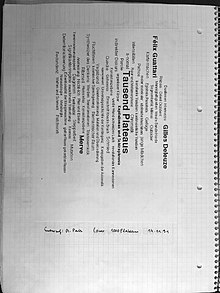Heidi Paris
Heidi Paris (* 1950 in Braunschweig ; † September 15, 2002 in Berlin , born Adelheid Paris ) was a German publisher , writer and artist .
Life
Paris grew up in Braunschweig as the child of a merchant family. Her father was said to have a past in the Waffen SS , but this is not documented. After graduating from high school in 1969, she was a dramaturge assistant at the State Theater in Braunschweig . From 1970 to 1975 she studied German , comparative literature and philosophy at the Free University of Berlin . In 1974 she met her long-term partner Peter Gente in a pub in Berlin-Schöneberg. Together they ran Merve Verlag , which published numerous works on post-structuralist theory.
In the autumn of 1977 she was arrested in Berlin together with the philosopher Michel Foucault . While having breakfast with Foucault in a hotel on Güntzelstrasse, a guest alerted the police; he had mistaken Paris for the RAF terrorist Inge Viett . After three police cars pulled up in front of the hotel, police officers took the group away with submachine guns and took them to solitary cells. They were released after half an hour.
From 2001 Paris suffered more from schizophrenia . She spoke to her friend, the writer and doctor Rainald Goetz , about her intention to take her own life. She attempted suicide on the night of September 10-11, 2002, and died on September 15th. She did not leave a suicide note, but had pinned a note on her bookshelf: “The void we leave completely replaces us.” Paris is buried in the old St. Matthew Cemetery in Berlin-Schöneberg .
Act
In 1986 she organized an international symposium on the subject of "Philosopher-Artists" at the F + F Art School in Zurich, from which the magazine stop-art emerged . In 1988 she organized an international symposium for ars electronica Linz on the subject of "Philosophies of New Technologies" with Jean Baudrillard , Vilém Flusser , Heinz von Foerster , Friedrich Kittler and Peter Weibel, among others . In 1989 she organized a symposium there on the subject of "In the network of systems". From 1990 she worked with the Institute for New Media at the Frankfurt Städelschule . In 1990 she organized a symposium on nomadism at the Styrian Autumn in Graz with Achille Bonito Oliva and Sylvère Lotringer, among others . In 1991 she organized an international conference with the Giannozzo Art Association in Berlin on the subject of "Dangerous Living. The Experimental in Art and Science". In 1993 and 1994 she was a juror for design at the Akademie Schloss Solitude .
Between 1980 and 1999, Paris wrote diaries which are published as chronicles on her website.
The cover design of the German edition of the book Tausend Plateaus by Gilles Deleuze and Félix Guattari from 1991 comes from Paris. The draft for the book, published in 1992, is an early form of the word cloud .
Appreciations
In autumn 2012, two exhibitions on Paris' 10th anniversary of her death were held in the Museum of Unheard of Things in Berlin-Schöneberg and in the WYSIWYG club and gallery in Berlin-Friedrichshain: 365 verbs and The Spaghetti Chair with 50 drawings from her estate. The director Agnes Handwerk showed her documentary film Foucault in / à Berlin (1992/2004) about the arrest in 1977. Blixa Bargeld remembered Paris.
Web links
Website with texts from the estate
Individual evidence
- ↑ Philip Felsch: Merves laugh . In: Journal for the history of ideas . No. 2 , 2008, p. 21 .
- ↑ Michel Foucault: "We felt like a filthy species". In: Spiegel. December 19, 1977. Retrieved September 17, 2019 .
- ↑ Obituaries and Remembrance. Retrieved September 17, 2019 .
- ↑ Andreas Hiepko: ΣΚΙΑΣ ΟΝΑΡ. In: Messages from the case. September 2, 2014, accessed September 17, 2019 .
- ↑ Adelheid Paris' biography (1995). Retrieved September 17, 2019 .
- ↑ Chronicles. Retrieved September 17, 2019 .
- ↑ in memoriam Heidi Paris († September 15, 2002). Retrieved September 17, 2019 .
| personal data | |
|---|---|
| SURNAME | Paris, Heidi |
| ALTERNATIVE NAMES | Paris, Adelheid (maiden name) |
| BRIEF DESCRIPTION | German publisher, writer and artist |
| DATE OF BIRTH | 1950 |
| PLACE OF BIRTH | Braunschweig |
| DATE OF DEATH | September 15, 2002 |
| Place of death | Berlin |
